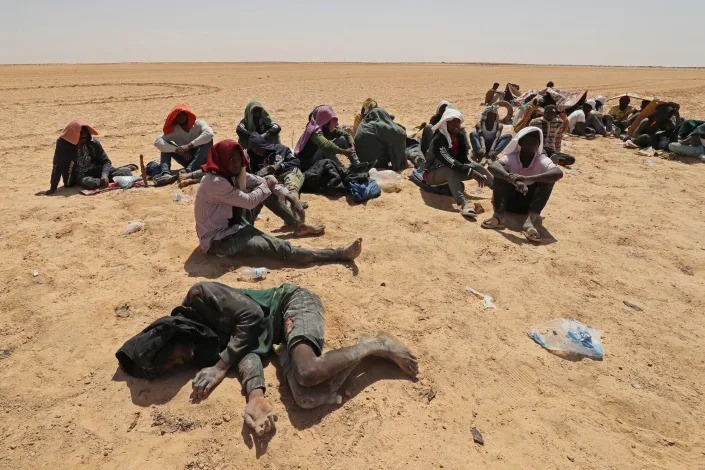You are here: Home | News | Regional | World News | ‘We are dying’: Migrants’ plea from Libya-Tunisia border

Sub-Saharan African migrants stranded in a buffer zone between Libya and Tunisia (Mahmud TURKIA/AFP)
African migrants pleaded to be saved from a desert zone between Libya and Tunisia on Wednesday, weeks after Tunisian authorities allegedly dumped dozens of them there with nothing.
“We are dying. We are dying by the minute,” a Nigerian who wanted to be identified only by his first name, George, told AFP.
“Please, I’m begging you. Take us from here now,” said George, 43. “Come and rescue us from this place.”
On Tuesday Libya’s interior ministry said the bodies of five African migrants had been found near Tunisia’s border.
The group of about 140 migrants from sub-Saharan Africa are the latest to be taken to Tunisia’s borderlands with Libya or Algeria, according to border guards, migrants and NGO workers who reported previous cases.
“We don’t know where we are living here. We’ve been suffering with no food and no water,” George said at the migrants’ makeshift camp among barbed wire 30 metres (33 yards) from a Libyan border post on the seashore at Ras Jedir.
He said he had been working as a barber for 18 months in the Tunisian coastal city of Sfax, where his wife and baby remained after he was forced out.
“The Tunisian police, they aim their weapons… and say we are terrorists,” George said.
The Libyans tell the migrants not to go further into their territory, leaving them “stuck in the middle,” George said, as a heatwave grips the Mediterranean.
Through the Red Crescent the Libyans have, however, brought them some food and water, which they share among themselves.
Another migrant, Fatima, 36, from Niger, said Tunisian soldiers “took everything from us”, including their mobile phones, and left them there. She also declined to give a last name.
Some held up torn pieces of cardboard with hand-written messages. One asked the International Organization for Migration to “help please”.
“We are humans,” another said.
– Racial tensions –
In early July, hundreds of migrants from sub-Saharan African countries were driven out of the Tunisian port city of Sfax as racial tensions flared following the death of a Tunisian man in a clash between locals and migrants.
At its closest point, near Sfax, Tunisia is only about 130 kilometres from the Italian island of Lampedusa. The North African country is a gateway for migrants and asylum-seekers attempting perilous sea voyages in hopes of a better life in Europe.
Mubarak Adam Mohamad, 24, said he had fled the war in Sudan for Libya before reaching Tunisia.
“I was arrested by the police in Sfax and brought here by force,” he told AFP, appealing for “regional and international organisations” to rescue them.
Medecins du Monde, an aid group, called on Tunisian authorities to facilitate humanitarian access.
“These people find themselves in a situation of great vulnerability,” the group said in a statement.
Human Rights Watch said up to 1,200 black Africans were “expelled or forcibly transferred by Tunisian security forces” to the country’s desert border regions with Libya and Algeria this month.
In mid-July the Tunisian Red Crescent said it had provided shelter to at least 630 migrants who had been taken after July 3 to Ras Jedir, north of Al-Assah.
Around the same time, Libyan border guards also said they rescued dozens of migrants left in the desert by Tunisian authorities without water and food.
An AFP team at the time saw migrants who were visibly exhausted and dehydrated, sitting or lying on the sand and using shrubs to try and shield themselves from the heat that topped 40 degrees Celsius (104 Fahrenheit).
The group were in an uninhabited area close to Al-Assah.
Support Eye Radio, the first independent radio broadcaster of news, information & entertainment in South Sudan.
Make a monthly or a one off contribution.
Copyright 2024. All rights reserved. Eye Radio is a product of Eye Media Limited.